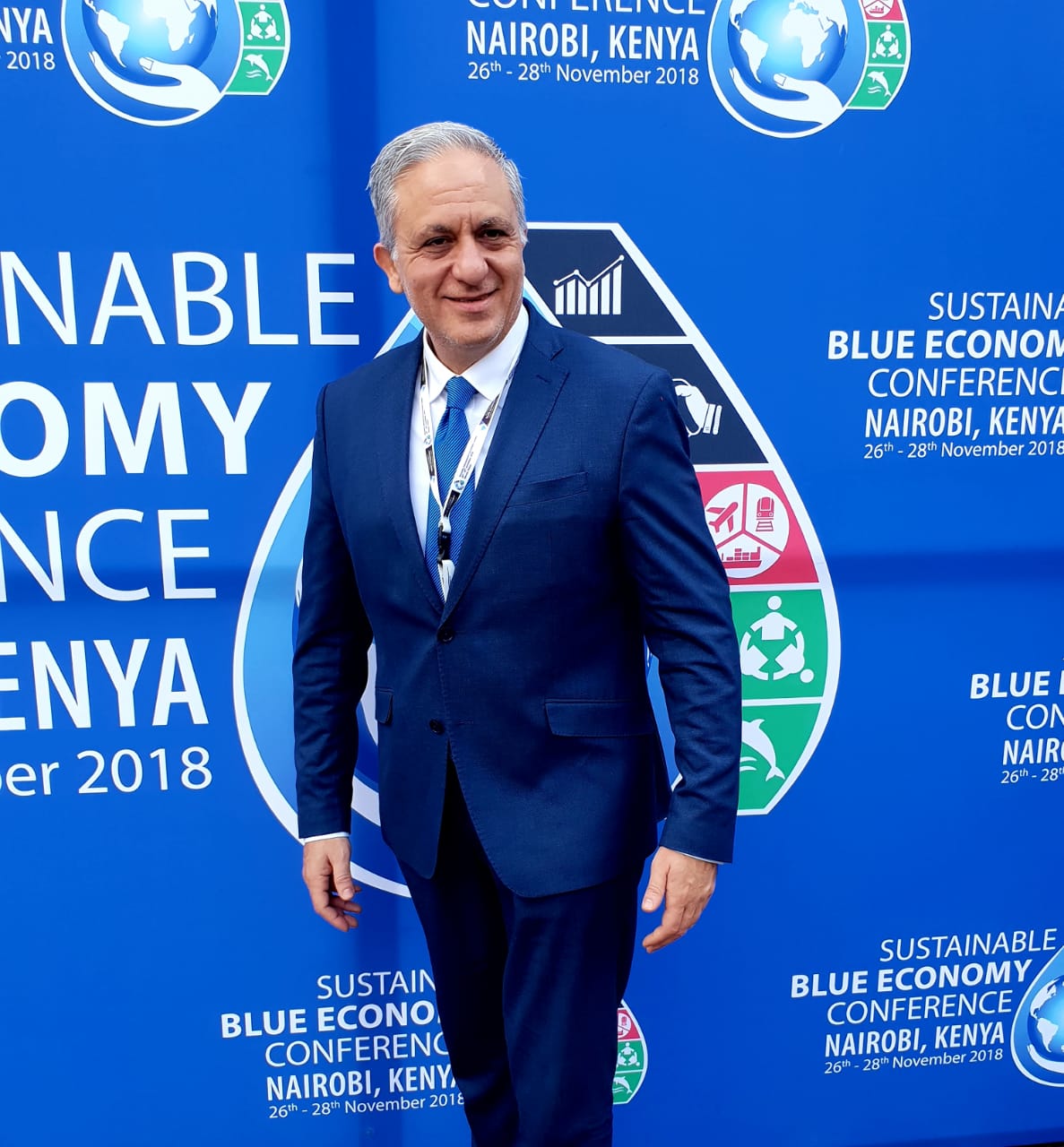
Τορναρίτης: Η θάλασσα αποτελεί αναπόσπαστο μέρος της ταυτότητας και της οικονομίας της Κύπρου
ΔΕΛΤΙΟ ΤΥΠΟΥ
Συνεχίζονται σήμερα στο Ναϊρόμπι της Κένυας, οι εργασίες της Διάσκεψης υψηλού επιπέδου για την Αειφόρο Μπλε Οικονομία, στις οποίες συμμετέχει ο Κοινοβουλευτικός Εκπρόσωπος του Δημοκρατικού Συναγερμού και Αναπληρωτής Πρόεδρος της Επιτροπής Εξωτερικών της Βουλής των Αντιπροσώπων, κ. Νίκος Τορναρίτης.
Η Διάσκεψη προωθεί την παγκόσμια συζήτηση για την αειφόρο ανάπτυξη της Μπλε Οικονομίας και σε αυτή συμμετέχουν περισσότεροι από 30 αρχηγοί κρατών και κυβερνήσεων και πέραν των 3000 αντιπροσώπων από όλο τον κόσμο, από κράτη-μέλη και οργανισμούς του ΟΗΕ, πολυμερείς τράπεζες ανάπτυξης, διεθνείς οργανισμούς, ιδιωτικές εταιρείες και Μη Κυβερνητικές Οργανώσεις.
Σε παρέμβασή του, κατά τη διάρκεια των συζητήσεων, ο κ. Τορναρίτης υπογράμμισε πρώτιστα τις πολύ καλές διαχρονικές σχέσεις μεταξύ Κύπρου και Κένυας, οι οποίες παραμένουν σταθερές και βασισμένες στην αμοιβαία υποστήριξη και αλληλεγγύη. Ο κ. Τορναρίτης διαβεβαίωσε τους Κενυάτες αξιωματούχους, ότι η Κύπρος παραμένει ισχυρός σύμμαχος της Κένυας στο πλαίσιο της Ευρωπαϊκής Ένωσης.
Ο κ. Τορναρίτης τόνισε κυρίως τη μεγάλη σημασία που έχει η Μπλε Οικονομία για το παρόν και το μέλλον της παγκόσμιας κοινότητας, εφόσον το 90% του παγκόσμιου εμπορίου διεξάγεται δια θαλάσσης και η παγκόσμια οικονομία βασίζεται σε μεγάλο βαθμό σε τομείς που συνδέονται άμεσα με τη θάλασσα, όπως είναι η ναυτιλία, ο τουρισμός, η αλιεία, αλλά και το πετρέλαιο, το φυσικό αέριο και οι διάφορες σχετικές ανανεώσιμες πηγές ενέργειας.
Σύμφωνα με τον κ. Τορναρίτη, οι οικονομικοί τομείς που συνθέτουν την Μπλε Οικονομία μπορούν να συμβάλουν σημαντικά στην ανάπτυξη της οικονομίας, ιδιαίτερα στην περίπτωση ενός νησιού όπως η Κύπρος. Όπως ανάφερε, η Κύπρος, της οποίας ο πολιτισμός και η οικονομία συνδέονται στενά στην πάροδο του χρόνου με τη θάλασσα, έχει ζωτικό οικονομικό συμφέρον για την προστασία της ποιότητας των θαλάσσιων υδάτων. Η θάλασσα συνδέεται με τον τουρισμό και τη ναυτιλία, που είναι δύο από τους βασικότερους πυλώνες της κυπριακής οικονομίας, καθώς και την υδατοκαλλιέργεια, ένας τομέας στον οποίο η Κύπρος πρωτοστατεί. Σε αυτό το πλαίσιο, κ. Τορναρίτης επεσήμανε ότι η Κύπρος, εκμεταλλευόμενη τη θάλασσα και τη γεωγραφική της θέση, παραμένει σήμερα μια σημαντική ναυτική εμπορική δύναμη και στρατηγικός κόμβος ανάμεσα σε Ευρώπη, Ασία και Αφρική.
Εξάλλου, στο περιθώριο των εργασιών της Διάσκεψης, ο κ. Τορναρίτης πραγματοποίησε επαφές με τον Πρόεδρο της Κένυας, κ. Uhuru Kenyatta, τον Πρόεδρο των Σεϋχελλών, κ. Wallace Cosgrow, καθώς και την πρωθυπουργό της Ναμίμπια, Δρα Saara Kuugongelwa.
Λευκωσία, 27 Νοεμβρίου 2018
Ακολουθεί πιο κάτω το γραπτό κείμενο της παρέμβασης του κ. Τορναρίτη:
Your Excellency,
Honorable Ladies and Gentlemen,
Dear Colleagues and Friends,
Allow me first to convey the warm greetings of H.E. The President of the House of Representatives of the Republic of Cyprus, Mr. Demetris Syllouris and his wishes for every success to our deliberations during this Conference.
Cyprus and Kenya share a very good level of relations, dating back to the independence of our respective countries, deriving from the personal friendship of our historic leaders, Archbishop Makarios and Jomo Kenyatta. Since then, brotherly relations between Cyprus and Kenya have remained unwavering, based on mutual support and solidarity. Within the European Union context, we assure you that Cyprus will always be Kenya’s strongest ally and that your country can always count on our support.
I wish to express the Cyprus House of Representatives’ willingness to work for further deepening these relations at the parliamentary level. There is always room for improvement in many fields, especially in the financial sector, investment and tourism, where our respective Parliaments can exchange ideas and best practices.
Today’s meeting gives me the opportunity to discuss the concept of the Blue Economy and its great potential. With 70% of the planet covered by water, economies rely on fisheries, transport, maritime safety, tourism, oil and gas and renewable energy and with 90% of world trade being conducted by sea, the importance of the Blue Economy cannot be overlooked.
The economic sectors that comprise the Blue Economy can have a significant contribution to the economy, particularly in the case of an island like Cyprus. The sea has always been important to Cyprus as a source of growth and progress, developing sectors such as maritime and coastal tourism, merchant shipping, fishing and aquaculture, and more recently the emerging prospects of the development of sectors such as offshore extraction of oil and natural gas.
Particularly as regards the development of aquaculture, I would like to stress the fact that it constitutes a major pillar and an integral part of Blue Economy. Taking into consideration the increasing demand in food supply and especially fishery products, aquaculture has an important role in contributing towards food security. The sustainable development of this activity, financially, socially and environmentally, must be supported and further developed on a global scale. In this framework, I would also like to inform you that Cyprus has been appointed as a Champion country for aquaculture in the context of the Commonwealth Blue Charter.
As a vital component of coastal economies across the world, oceans can also contribute to our planet’s overall prosperity. They can produce investments, jobs and economic growth and the healthier they are, the more productive they will be. Therefore, the Blue Economy must be a Sustainable Blue Economy.
It is not by chance that the Earth is referred to as the ‘Blue Planet’. Not only an essential provider to society, the sea is also a vital part of our countries’ identity and economy. Defined as smart, sustainable and inclusive economic and employment growth from the oceans, seas and coasts, I believe that the Blue Economy, with all due caution and care for our environment, can serve as a new trail in the world’s sustainable future, worth exploring further.
Thank you for your attention.